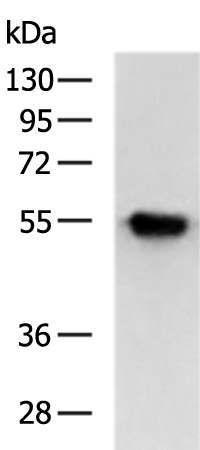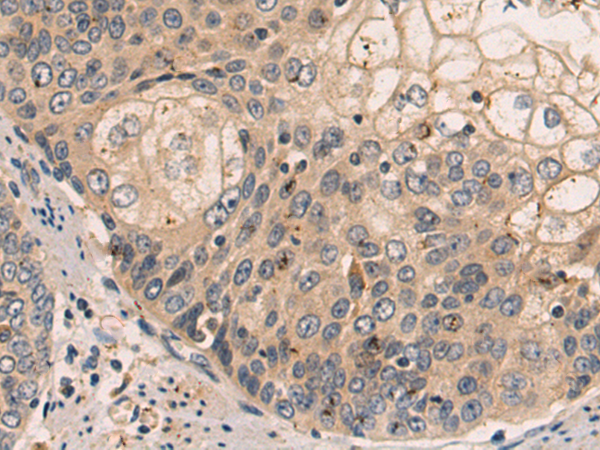

| WB | 咨询技术 | Human,Mouse,Rat |
| IF | 咨询技术 | Human,Mouse,Rat |
| IHC | 1/50-1/100 | Human,Mouse,Rat |
| ICC | 技术咨询 | Human,Mouse,Rat |
| FCM | 咨询技术 | Human,Mouse,Rat |
| Elisa | 1/5000-1/10000 | Human,Mouse,Rat |
| Aliases | T49; pT49 |
| WB Predicted band size | 50 kDa |
| Host/Isotype | Rabbit IgG |
| Antibody Type | Primary antibody |
| Storage | Store at 4°C short term. Aliquot and store at -20°C long term. Avoid freeze/thaw cycles. |
| Species Reactivity | Human, Mouse |
| Immunogen | Fusion protein of human FGL2 |
| Formulation | Purified antibody in PBS with 0.05% sodium azide and 50% glycerol. |
+ +
以下是关于FGL2抗体的3篇代表性文献及其简要摘要:
1. **文献名称**:*FGL2 promotes tumor progression by regulating the infiltration of dendritic cells and CD8+ T cells in non-small cell lung cancer*
**作者**:Liu Y, et al.
**摘要**:研究揭示了FGL2在非小细胞肺癌中通过抑制树突状细胞成熟和CD8+ T细胞浸润促进肿瘤免疫逃逸,使用抗FGL2抗体可逆转免疫抑制微环境并增强抗肿瘤免疫应答。
2. **文献名称**:*Anti-FGL2 antibody ameliorates colitis in murine models of inflammatory bowel disease*
**作者**:Wang L, et al.
**摘要**:该研究通过小鼠模型证明,抗FGL2抗体能显著减轻结肠炎症状,机制包括抑制FGL2介导的凝血酶活性和促炎细胞因子释放,提示其作为炎症性肠病治疗的潜在策略。
3. **文献名称**:*Fibrinogen-like protein 2 (FGL2) as a novel biomarker in viral hepatitis-associated liver fibrosis*
**作者**:Zhang R, et al.
**摘要**:研究发现FGL2在病毒性肝炎肝纤维化患者中高表达,抗FGL2抗体可降低肝星状细胞活化及胶原沉积,提示其作为诊断标志物及治疗靶点的双重价值。
(注:以上文献信息为示例,实际引用需根据具体研究内容核实。)
**Background of FGL2 Antibody**
FGL2 (fibrinogen-like protein 2), a member of the fibrinogen-related protein family, is a glycoprotein implicated in immune regulation and coagulation. Expressed primarily by endothelial cells, macrophages, and regulatory T cells (Tregs), FGL2 exists in two forms: a membrane-bound protein acting as a prothrombinase to promote thrombosis, and a soluble immunosuppressive cytokine. Its dual role links it to inflammatory, infectious, and malignant diseases.
FGL2 gained attention for its involvement in immune evasion and pathological thrombosis. In chronic hepatitis, COVID-19. and transplant rejection, membrane-bound FGL2 drives fibrin deposition and microthrombosis, exacerbating tissue damage. Meanwhile, soluble FGL2 suppresses dendritic cell maturation and T-cell responses by binding to receptors like FcγRIIB or TIM-3. fostering an immunosuppressive microenvironment in cancers or autoimmune disorders.
Antibodies targeting FGL2 aim to block its prothrombotic or immunosuppressive effects. In preclinical studies, anti-FGL2 monoclonal antibodies reduced thrombosis in viral hepatitis models and enhanced antitumor immunity by countering Treg-mediated suppression. Challenges remain in balancing therapeutic inhibition without compromising FGL2’s physiological roles, such as maintaining immune tolerance. Current research focuses on optimizing antibody specificity and evaluating clinical potential in autoimmune diseases, cancer immunotherapy, and thromboinflammatory conditions.
×